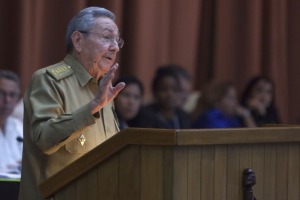nsnbc : Cuban President Raul Castro met with North Korean Foreign Minister Ri Yong-ho in Friday at the U.N. Plaza Hotel in New York, on September 25. Cuba, a traditional North Korean ally, is opposed to nuclear weapons while Pyongyang feels the need to defy international sanctions and develop nuclear energy and defensive nuclear capabilities.
 The meeting between Castro and Ri prompted hopes that Cuba may help deescalate tensions between Washington and Pyongyang. The Democratic People’s Republic of Korea (DPRK) is facing unprecedented pressure from the United States and the so-called “international community”.
The meeting between Castro and Ri prompted hopes that Cuba may help deescalate tensions between Washington and Pyongyang. The Democratic People’s Republic of Korea (DPRK) is facing unprecedented pressure from the United States and the so-called “international community”.
Ironically this “international community” includes all five permanent UN Security Council members who all have nuclear weapons arsenals sufficient to cause a global disaster and blackmail the rest of the world. Cuba has maintained close diplomatic ties with North Korea since 1960, but is opposed to nuclear weapons.
Cuban State television reported on the meeting between Castro and Ri in absolutely ambiguous terms typical for State media, stating ‘In the brotherly encounter, both sides commented on the historic friendship between the two nations and talked about international topics of mutual interest.’
Canadian Prime Minister Justin Trudeau said Thursday that he had discussed with Castro last year the possibility of working together to defuse global tensions with North Korea. ‘Can we pass along messages through surprising conduits?’ Trudeau asked in a QandA session after a speech. ‘It was a topic of conversation when I met President Raul Castro last year. These are the kinds of things where Canada can, I think, play a role that the United States has chosen not to play, this past year.’
Canada had an interest in seeking solutions, not just because of regional security but also because the flight path of possible North Korean missiles would cross its territory, Trudeau said.
North Korea is working on developing nuclear-tipped missiles capable of hitting the U.S. mainland, aiming to achieve what Ri has called ‘a real balance of power with the United States.’ It should be noted that the DPRK only resumed construction of nuclear power plants and the development of nuclear-capable missiles after the USA failed to adhere to its promise to build nuclear power plants in North Korea.
Ri met his Cuban counterpart, Bruno Rodriguez, this week, and the ministers denounced U.S. ‘unilateral and arbitrary lists and designations’ that led to ‘coercive measures contrary to international law,’ according to Cuba’s foreign ministry. The ministers called for ‘respect for peoples’ sovereignty’ and the ‘peaceful settlement of disputes,’ according to a ministry statement.
President Donald Trump has increased pressure on Cuba since taking office, rolling back a detente begun by his predecessor, Barack Obama, and returning to the hostile rhetoric of the Cold War.
North Korea and Cuba are the last countries in the world to maintain Soviet-style command economies, though under Raul Castro, the Caribbean nation has taken small steps toward the more market-oriented communism of China and Vietnam.
Raul took over the presidency in 2008 from revolutionary leader Fidel Castro, his older brother, who died November 25, 2016. Cuba is marking the anniversary on Saturday with vigils and concerts. Cuba maintains an embassy in North Korea but trades mostly with South Korea. Last year, trade with the latter was $67 million and just $9 million with the North, the government said.
F/AK – nsnbc 25.11.2017
Source Article from https://nsnbc.me/2017/11/25/cuba-dprk/
 RSS Feed
RSS Feed















 November 26th, 2017
November 26th, 2017  Awake Goy
Awake Goy 










 Posted in
Posted in  Tags:
Tags: 













